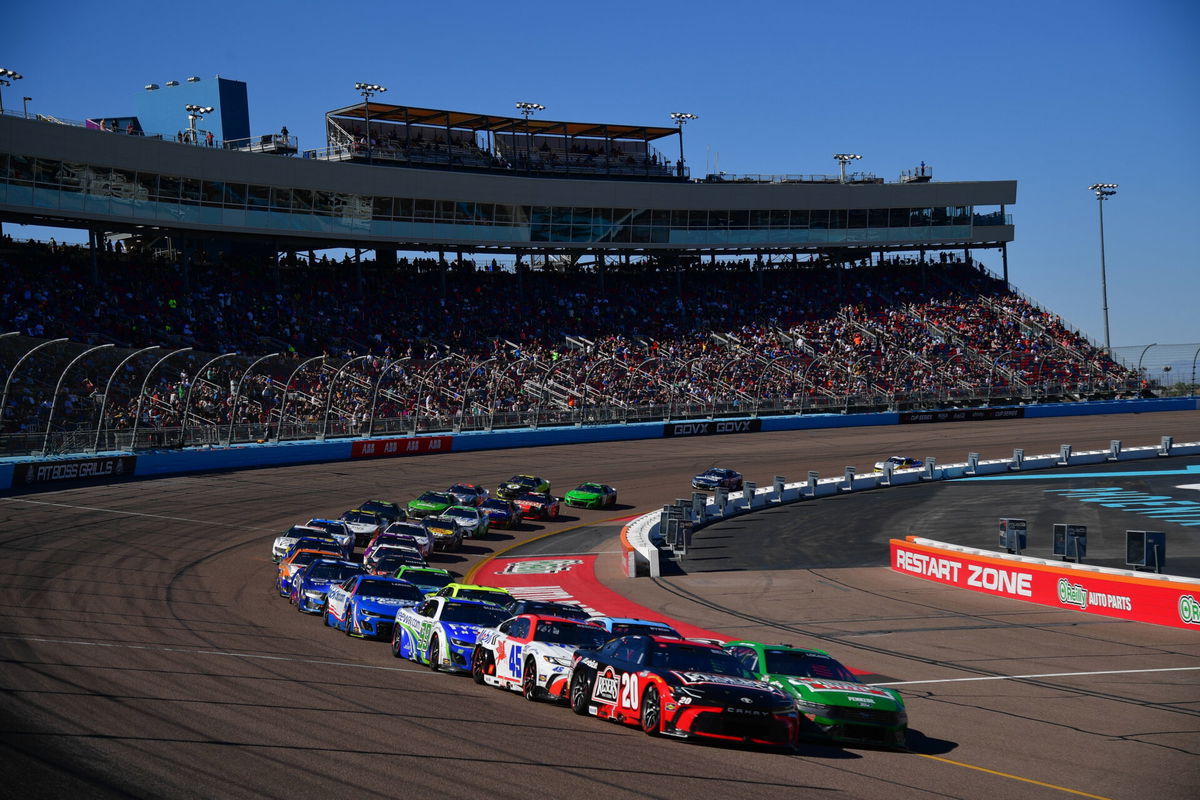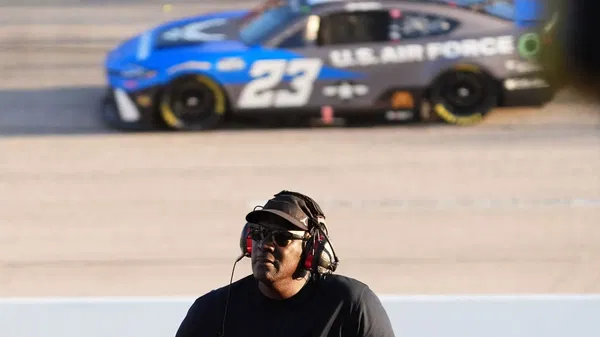
Imago
NASCAR, Motorsport, USA Shriners Children s 500 Mar 9, 2025 Avondale, Arizona, USA NASCAR Cup Series driver Christopher Bell 20 and driver Joey Logano 22 lead during the restart of the Shriners Childrens 500 at Phoenix Raceway. Avondale Phoenix Raceway Arizona USA, EDITORIAL USE ONLY PUBLICATIONxINxGERxSUIxAUTxONLY Copyright: xGaryxA.xVasquezx 20250309_gav_sv5_059

Imago
NASCAR, Motorsport, USA Shriners Children s 500 Mar 9, 2025 Avondale, Arizona, USA NASCAR Cup Series driver Christopher Bell 20 and driver Joey Logano 22 lead during the restart of the Shriners Childrens 500 at Phoenix Raceway. Avondale Phoenix Raceway Arizona USA, EDITORIAL USE ONLY PUBLICATIONxINxGERxSUIxAUTxONLY Copyright: xGaryxA.xVasquezx 20250309_gav_sv5_059

Imago
NASCAR, Motorsport, USA Shriners Children s 500 Mar 9, 2025 Avondale, Arizona, USA NASCAR Cup Series driver Christopher Bell 20 and driver Joey Logano 22 lead during the restart of the Shriners Childrens 500 at Phoenix Raceway. Avondale Phoenix Raceway Arizona USA, EDITORIAL USE ONLY PUBLICATIONxINxGERxSUIxAUTxONLY Copyright: xGaryxA.xVasquezx 20250309_gav_sv5_059

Imago
NASCAR, Motorsport, USA Shriners Children s 500 Mar 9, 2025 Avondale, Arizona, USA NASCAR Cup Series driver Christopher Bell 20 and driver Joey Logano 22 lead during the restart of the Shriners Childrens 500 at Phoenix Raceway. Avondale Phoenix Raceway Arizona USA, EDITORIAL USE ONLY PUBLICATIONxINxGERxSUIxAUTxONLY Copyright: xGaryxA.xVasquezx 20250309_gav_sv5_059
The idea of a settlement seemed unfathomable. Ever since 23XI and Front Row Motorsports filed the NASCAR lawsuit in October last year, the sanctioning body, along with the plaintiffs, has removed the gloves in what has been a bloody boxing match. In Michael Jordan’s words from the famous ‘Last Dance’ documentary, the NBA Hall of Famer once said, “It became personal with me.” That’s exactly how the courtroom drama has been, and now the end is in sight.
Watch What’s Trending Now!
However, a veteran insider, who is an expert in dropping closed-door news, sees glimmers of hope. With the championship weekend behind us and pressure mounting, now it feels like the right time for a breakthrough that could steady the sport’s future. But what fuels that quiet optimism amid the tension?
Insider’s take on settlement
Jordan Bianchi, a sharp voice in NASCAR through his work at The Athletic, shared his grounded outlook during a recent chat on Kenny Wallace’s podcast. “They’ve been close,” he said, pointing to reports from just weeks back about negotiations talk, which was rumored to be achieved in the Phoenix Race weekend, but the talk came to no fruition. Yet, Bianchi holds firm: “There’s still time… I believe that they will eventually be a settlement reached just because it’s advantageous for both sides to come to some kind of compromise.”
This isn’t blind hope from an insider. It’s rooted in the high stakes of every antitrust case, where experts say settlements are often achieved in the final hours before the trials start. This is because no party wants to enter into the trial process and wants to settle the deal through negotiations between themselves.
Bianchi’s optimism ties back to the lawsuit’s core: 23XI and Front Row rejected NASCAR’s 2025-2031 charter extension deal by calling it a “take-it-or-leave-it” monopoly play that squeezed smaller teams on revenue from the $1.1 billion media bucket. In the lawsuit in Charlotte’s federal court, the case hit a tough corner for NASCAR when Judge Kenneth Bell showed frustration with NASCAR’s “heads we win, tails you lose” tactics during an early November hearing.

A recently mandated settlement conference in late October ended without any outcome. But Bianchi flags how these suits rarely enter trials. He pointed to how egos get checked and compromises are made in the fear of trial, especially given the stakes and how it could alter the sport permanently, especially if it goes in the plaintiffs’ favor.
Echoing that urgency, Joe Gibbs of Joe Gibbs Racing laid it bare in a court declaration: “The most important thing to me is that this lawsuit is resolved amicably, quickly, and in a manner that preserves the charter system and the long-term viability of our incredible sport. That must happen to ensure the health, happiness, and prosperity of our many hundreds of employees and their families. Nothing matters more to me.”
Gibbs, a five-time Cup champion as an owner, speaks from his experience in the sport. He was around when there was no charter system, and because of that, the small organizations were forced to shutter their operations in challenging circumstances. Figures like Ricky Rudd or Michael Waltrip sold their teams for minimum payouts. But the charter system brought stability for team owners, guaranteeing $100 million-plus annual payouts and stabilizing the open-entry chaos.
Gibbs’s push for a charter underscores the fear: a loss could end charters, which are valued at $45 million each, and also may reduce jobs and TV deals. And forcing NASCAR to rethink or rewrite the charter deal from scratch, as Bianchi warns. As talks pick up pace regarding settlements, let’s lift the curtain over why NASCAR is frustrated because of this lawsuit.
NASCAR’s quiet gripes in the charter clash
NASCAR poured goodwill into the 2016 charter system to end the financial fear of small teams by guaranteeing a racing spot and cash flows that increased the charter values from $2 million to $45 million in a decade. But now, with 23XI and Front Row suing over denied expansions and “anticompetitive” terms, both teams are running as open entries in 2025 without charter perks.
Jordan Bianchi points out that NASCAR feels the ache of ingratitude from both teams despite showing good faith by increasing the payouts in the new charter contract rolled out lasst year. Jordan Bianchi, unpacking it on the Kenny Wallace show, nailed the sentiment: “NASCAR, to its credit, went along with the charter system. They didn’t have to. It was almost a good-faith kind of thing. They did because they wanted to give value to the teams and to owners who have invested a lot of money into this.”
That trust eroded fast when 13 teams signed the new deal last year, only for those two teams to drag the matter to the courtroom. Bianchi went on to say, “There’s a frustration of, ‘We did all these things. We’ve acted in good faith…’ Last year, 13 teams were on board with this new agreement, and yet two of them weren’t, and they’re suing us.”
This lawsuit felt like a “betrayal” to NASCAR, and a defeat might risk going back to the pre-2016 era, where small teams faced uncertainties about a racing spot. This is the reason why the whole garage wants a mature settlement to take place before the lawsuit hits the trail, because after that, the decision will be made by the jury and the judge.



